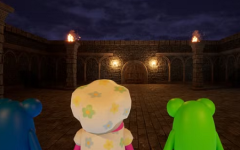Advertisement
Customer Support
Advertisement

Customer Support is a first‑person narrative experience where players take the role of a lone night‑shift worker at a small technical support store. The shift starts in complete calm, with only the low hum of equipment and the faint buzzing of fluorescent lights filling the air. The tasks seem harmless—routine cleaning, stocking shelves, and answering the store’s phone when it rings. Yet the silence of the empty shop and the repetition of simple work quickly create a strange sense of isolation. As the hours pass, the phone becomes more than just a tool for customer service—it becomes the central link to a series of conversations that slowly shift from ordinary to increasingly unsettling.
Early Routine And Player Flow
At first, the gameplay centers on performing basic workplace responsibilities. The player tidies the floor, keeps shelves stocked, and answers calls that begin as standard tech support inquiries. This stage of the game builds a steady rhythm, letting the player become familiar with the routine and the store’s layout. However, it also sets the stage for subtle disruptions to feel more noticeable later. The predictable pattern of tasks becomes a baseline against which small changes—slightly odd phrasing from a caller, a longer pause than expected—begin to feel significant.
Main Gameplay Loop
Throughout the shift, the player will:
- Perform cleaning and restocking duties in the store
- Answer calls and assist customers with basic problems
- Listen closely for unusual comments or unexpected questions
- Decide whether to respond casually or probe deeper
- Notice small environmental changes that may hint at something more
Each action is simple on its own, but together they form a loop that encourages attention to detail and sensitivity to changes in tone.
Escalation And Decision‑Making
As the night continues, the phone conversations begin to deviate from technical matters. Callers may start asking personal questions or referencing things that should be impossible for them to know. The player’s responses—whether curious, cautious, or dismissive—can alter the direction of the conversation and even the mood of the entire shift. Small choices build into larger consequences, affecting the player’s understanding of what’s happening and how the night will ultimately end.
Outcomes And Replay Value
Customer Support offers multiple possible endings that depend on how the player chooses to handle these strange interactions. Some paths keep the mystery vague, while others uncover unsettling truths that might have been better left hidden. Because of the branching possibilities, the game rewards replaying with different strategies to see new conversations and outcomes. The blend of quiet, repetitive work and creeping psychological tension makes the experience uniquely unnerving, ensuring that even the most routine tasks never feel entirely safe.






















































































































































